Rikyu is, for lack of a better comparison, the Mohammad of Japanese tea. All three of the formal schools claim descent from him, and among the many branches of tea ceremony most of them are intimately connected with the three schools. He has been almost sanctified in his treatment, and the image we now have of him, that of him in that square hat and black robe, is so deeply entrenched in the public imagination that one almost expects that to be him.
His greatest skill, I think, was not so much in the artistic arena, necessarily, but rather the political acumen that he possessed and the diplomatic skills he had to have in order to secure the continued patronage of two of the three unifiers of Japan, until, of course, his death at the order of the second of these three men, Toyotomi Hideyoshi. Like Rikyu, we also have a fairly set idea of of what these men were like – the brash and dominant visionary that was Oda, the rags to riches Toyotomi, and the reserved and cunning Tokugawa. Toyotomi’s (well deserved) reputation as a trickster and his lowborn background certainly added to that intrigue. Working for these two men was probably no easy task, and in being able to hold the position of tea master for these two, and being the most prominent of what was a constellation of tea masters, Rikyu must have had something extra special.
The 1989 film “Rikyu” is a slow, methodical piece. There the director was very much trying to portray Rikyu as a man of few words, driven, by the circumstances, into impossible positions, but always found an exit through tea and, in doing so, was able to create and pursue his aesthetic goals. However, because of the way it was shot and the story was told, it makes the movie difficult to watch even for people like us who love tea. I once showed it to my class, and I could tell that for freshmen students, it was a bit too much. Of course, when watching a movie about the tea ceremony, one can’t expect to see fireworks and swordfights, but when a movie spends fifteen minutes (or what feels like fifteen minutes) on a slow, mumbling conversation in a dark tea room, and when characters’ emotions are expressed only through a sideways glance or a twitch of the lips, it makes many demands on the viewer to be attentive and focused, much as a tea services does to the host.
The new 2013 film “Ask this of Rikyu”, which I just watched here in Taipei at the Spot Threatre (a great arthouse threatre for those coming to visit), is pretty much the polar opposite of the 1989 film. While both movies are anchored around the eventual death of Rikyu through seppuku, the contrast in the way the story is told and the way the characters are depicted cannot be more different. For one (and rather jarring for me) this Rikyu is young – too young by a long shot. When he became tea master to Oda, he was 58, an old man by the standards of his day, whereas the Rikyu in this movie is depicted as someone who was only beginning life – no later than perhaps 30 years old or so. The rest of the movie saves up some surprises along the way, but the Rikyu we see here is a heroic one – one who wears his emotions on his sleeves, who says things that are, sometimes, quite blunt and not politically safe, and who, in many ways, died for his ideals in what sounded a lot like a clash between church and state, except the church here is one where its adherents were in pursuit of beauty, and Rikyu was their prophet. Toyotomi, in this narrative, was jealous of the invisible power that Rikyu wielded (along with other slights along the way) and decided to get rid of him. I find this part of Rikyu to be less believable -Â he would have had a hard time securing long term patronage with this sort of high and mighty attitude in that world.
The Rikyu in this new movie is also a showman, and that, I do believe. His father was involved in the warehouse business, and selling things, including his way of tea, was always going to be an important part of his life. Selling his way of tea, which was becoming popular especially with the teaching of Rikyu’s own teacher, Takeno JÅÅ, was an important job that he did very well. Convincing people that less is more and broken is beautiful is not an easy job; teaching this to samurai, especially ones like Toyotomi who came from literally nothing, is probably even harder. That Rikyu was able to do it and to popularize wabi tea to the point where it became the orthodox is remarkable. In this sense, he was sort of like a charismatic religious figure. He must have been a great diplomat and communicator to get through to people with his tea.
I also suspect that it was Rikyu the diplomat that ultimately did him in. Both movies focus on Rikyu’s clash with Toyotomi as having something to do with aesthetics; in the 1989 movie Toyotomi simply does not understand beauty, whereas in this new version he is jealous of and desires the power of beauty. I wonder, though, if the reality was more mundane than that. One of the jobs Rikyu performed was to make connections. The small, cramped tea rooms he served tea in was the cigar-smoke filled lounges of his day; deals were made and alliances were struck this way. Both movies hint at this, but do not really expand on it, choosing instead to focus on the aesthetics side of the narrative. But maybe Rikyu the diplomat and negotiator simply knew too much, and by 1591, when both the Hojo and the Tokugawa clan were pacified (one eliminated, other neutralized), he had Japan in his firm grip. Rikyu was no longer useful, and keeping him around was dangerous. All the talk about the statue on the gate and what not was simply a pretense – he just needed to get rid of someone who knew too much.
Of course this narrative is not movie material – it’s a pretty mundane story if it’s just about Rikyu possessing too many secrets, and nobody would want to watch that. When people see a movie about Rikyu, they want to see tea, and they want to see how great he was at putting together a comprehensive philosophy with how tea can and should be appreciated. This need drives how movie scripts are written, which then further reinforce our views of what Rikyu was like. Commercial interests of course also determine storytelling decisions, and I have no doubt the more cartoonish portrayal of characters in this newer version (as well as other things I’ll leave you to discover yourself) led to how the story is told here. I have not read the novel this new film is based on, so I have no basis for comparison that way. It was entertaining, certainly more so than the 1989 film, and at its best moments it did make me think about how I drink and appreciate tea. That, perhaps, is good enough.
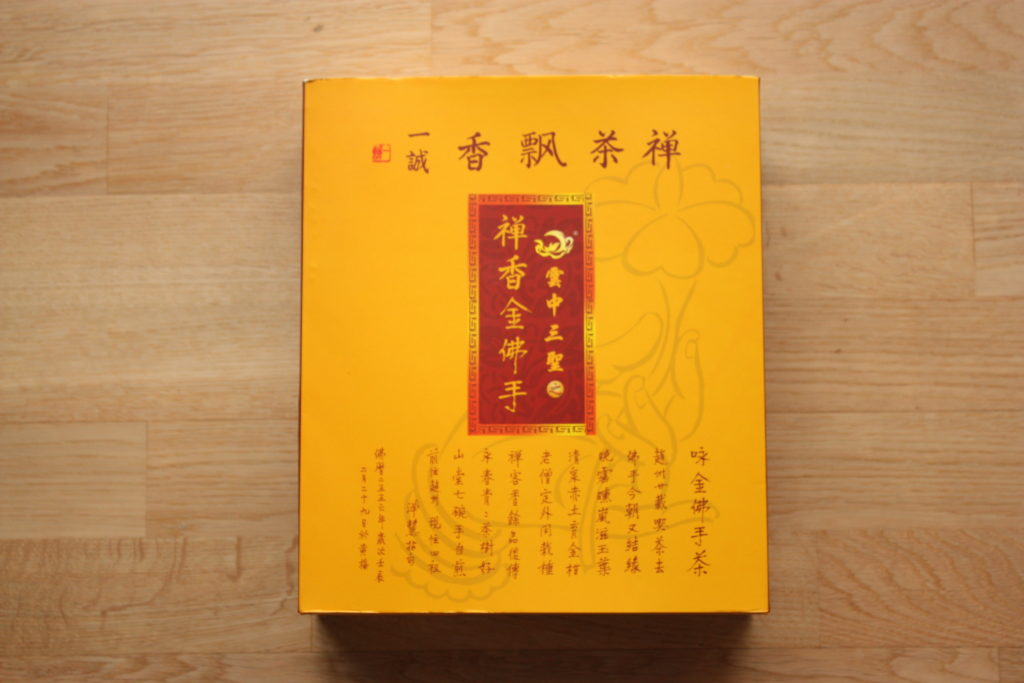 Now, a big box is pretty much de rigueur these days for gift tea. The box, it seems, must not be any smaller than about one foot by about a foot and half. Otherwise, it’s not a real gift. Now, the really fancy ones, like this, comes in a sleeve, so…
Now, a big box is pretty much de rigueur these days for gift tea. The box, it seems, must not be any smaller than about one foot by about a foot and half. Otherwise, it’s not a real gift. Now, the really fancy ones, like this, comes in a sleeve, so…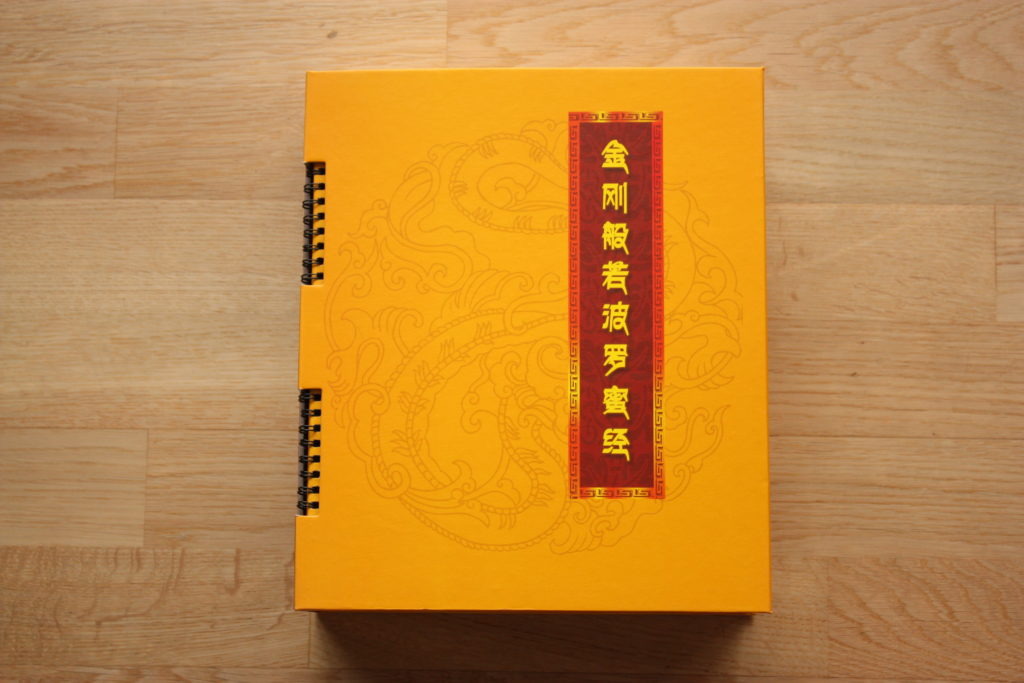 Yeah, this is the actual box. What does that say? Why does it say Diamond sutra, instead of tea? Well, this is a Buddhism inspired tea, apparently, and the tea itself is some foshou (Buddha’s hand), a varietal. It’s from Fujian, and made as an oolong. The whole connection is explained once you open the box.
Yeah, this is the actual box. What does that say? Why does it say Diamond sutra, instead of tea? Well, this is a Buddhism inspired tea, apparently, and the tea itself is some foshou (Buddha’s hand), a varietal. It’s from Fujian, and made as an oolong. The whole connection is explained once you open the box.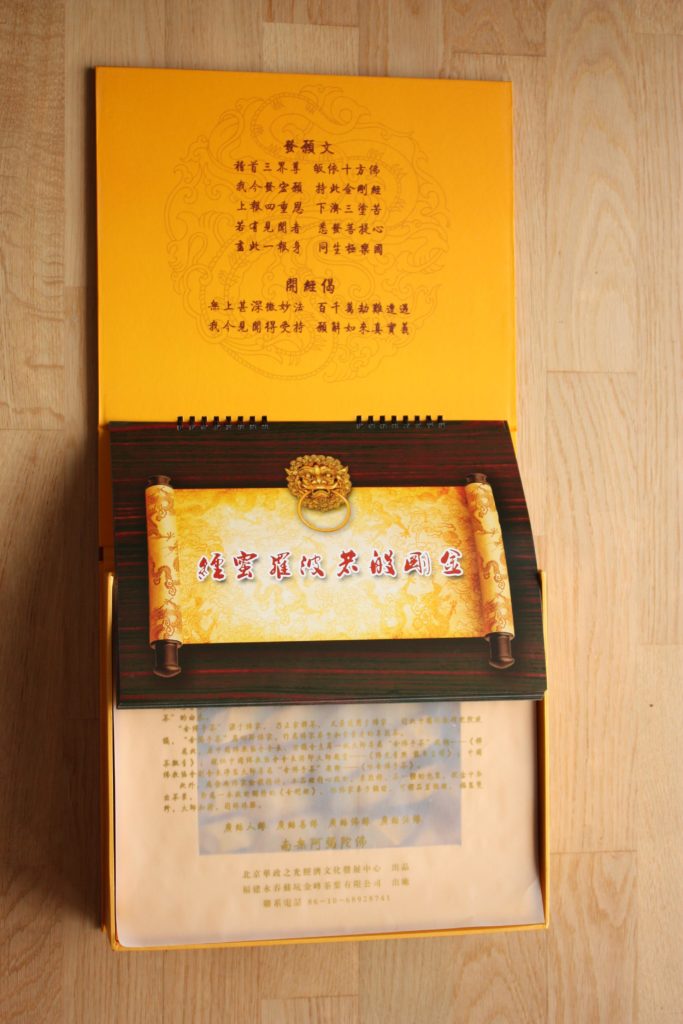 So there’s this sutra, literally, in the box in the form of a little booklet (note the nice touch of printing it on paper on what looks like a scroll). Then there’s that white piece of paper that explains everything
So there’s this sutra, literally, in the box in the form of a little booklet (note the nice touch of printing it on paper on what looks like a scroll). Then there’s that white piece of paper that explains everything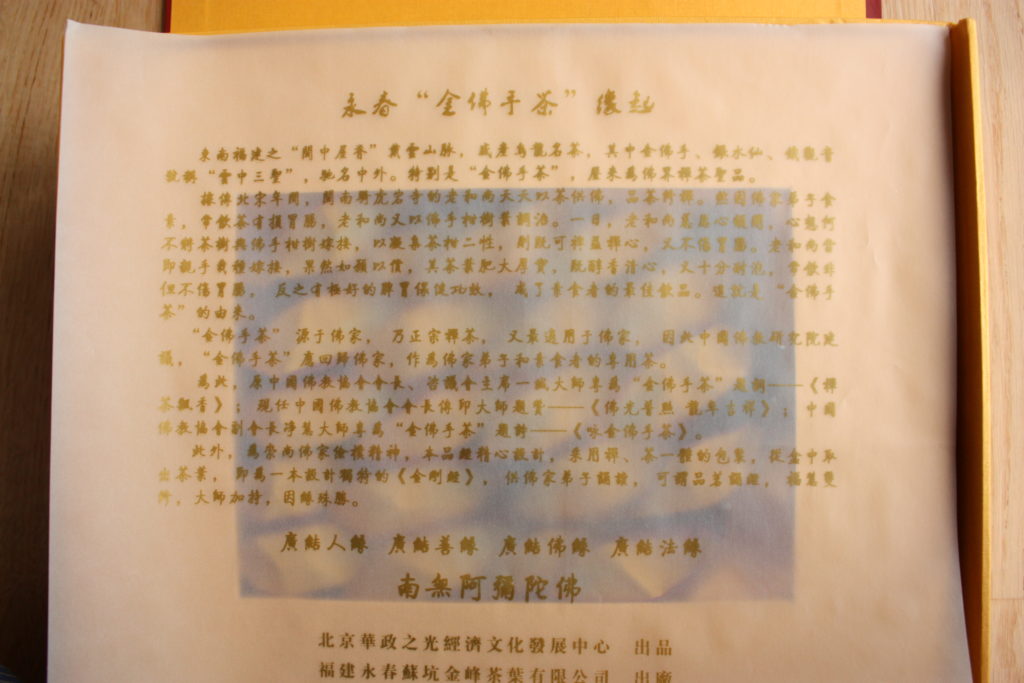 I won’t bore you with the details, but the fun part is – they claim that among teas made in Fujian, there are the “Three Saints in the Clouds”, which are, in order, Gold Foshou (jinfoshou) , Silver Shuixian (yinshuixian), and Iron Guanyin (tieguanyin). Note how tieguanyin, generally seen as the best of the bunch among southern Fujian teas, is relegated to third place – if gold foshou comes before it, it must be better, no? Oh, and that sutra – it’s there so you can read the sutra while you drink tea, because foshou (because of its supposed Buddhist connection in origin, etc) is particularly suited to Buddhists for meditation and what not. Needless to say, it’s all humdrum marketing speak.
I won’t bore you with the details, but the fun part is – they claim that among teas made in Fujian, there are the “Three Saints in the Clouds”, which are, in order, Gold Foshou (jinfoshou) , Silver Shuixian (yinshuixian), and Iron Guanyin (tieguanyin). Note how tieguanyin, generally seen as the best of the bunch among southern Fujian teas, is relegated to third place – if gold foshou comes before it, it must be better, no? Oh, and that sutra – it’s there so you can read the sutra while you drink tea, because foshou (because of its supposed Buddhist connection in origin, etc) is particularly suited to Buddhists for meditation and what not. Needless to say, it’s all humdrum marketing speak.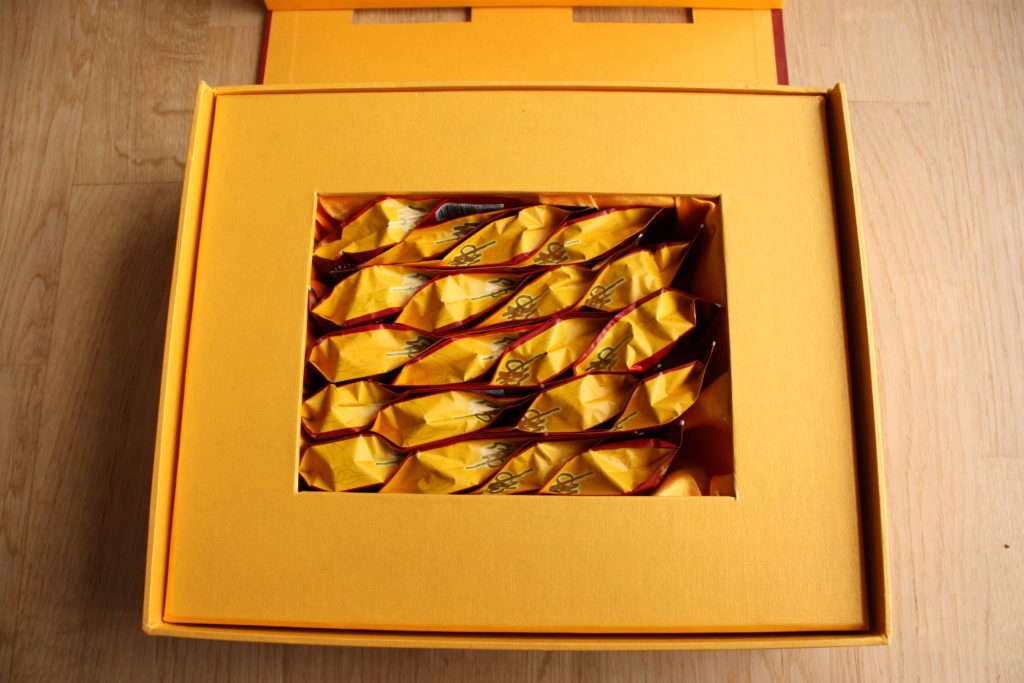 Note how the actual amount of tea takes up less than half of the space of the box – the rest is actually just wasteful styrofoam. There are 20 bags here, each containing 7g of tea – so basically about 140g of tea.
Note how the actual amount of tea takes up less than half of the space of the box – the rest is actually just wasteful styrofoam. There are 20 bags here, each containing 7g of tea – so basically about 140g of tea.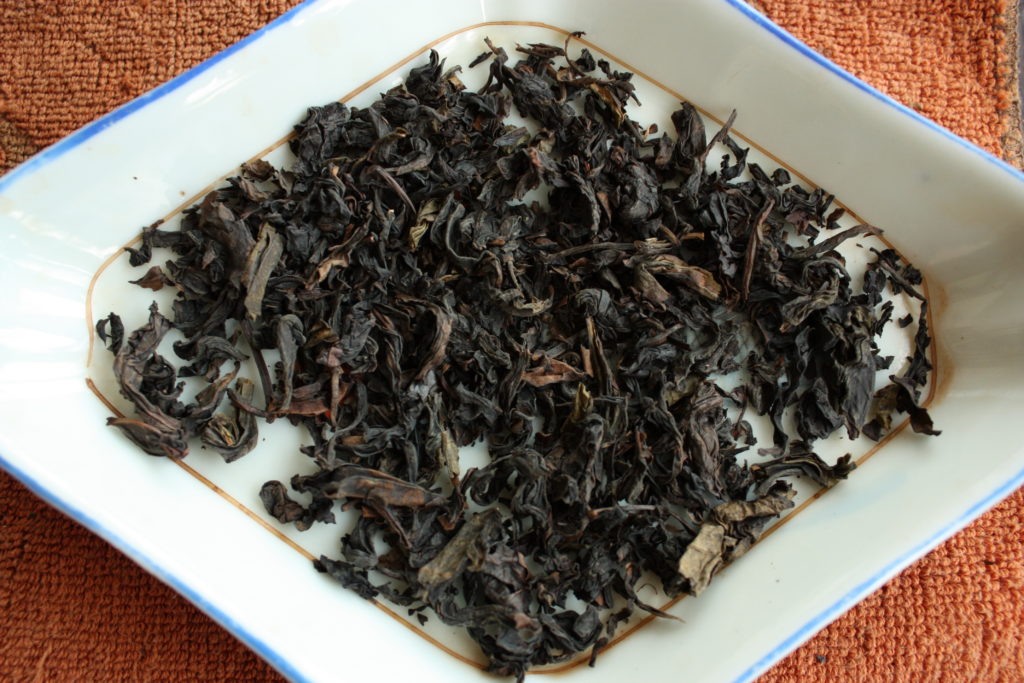 Honestly – looks worse in person than on picture. It’s a mess – most of it is broken bits, and the leaves that are intact are a mixed bag, including leaves that are obviously “yellow leaves”. Compared it with another gift tea we received a while ago that I talked about – a supposed dahongpao.
Honestly – looks worse in person than on picture. It’s a mess – most of it is broken bits, and the leaves that are intact are a mixed bag, including leaves that are obviously “yellow leaves”. Compared it with another gift tea we received a while ago that I talked about – a supposed dahongpao.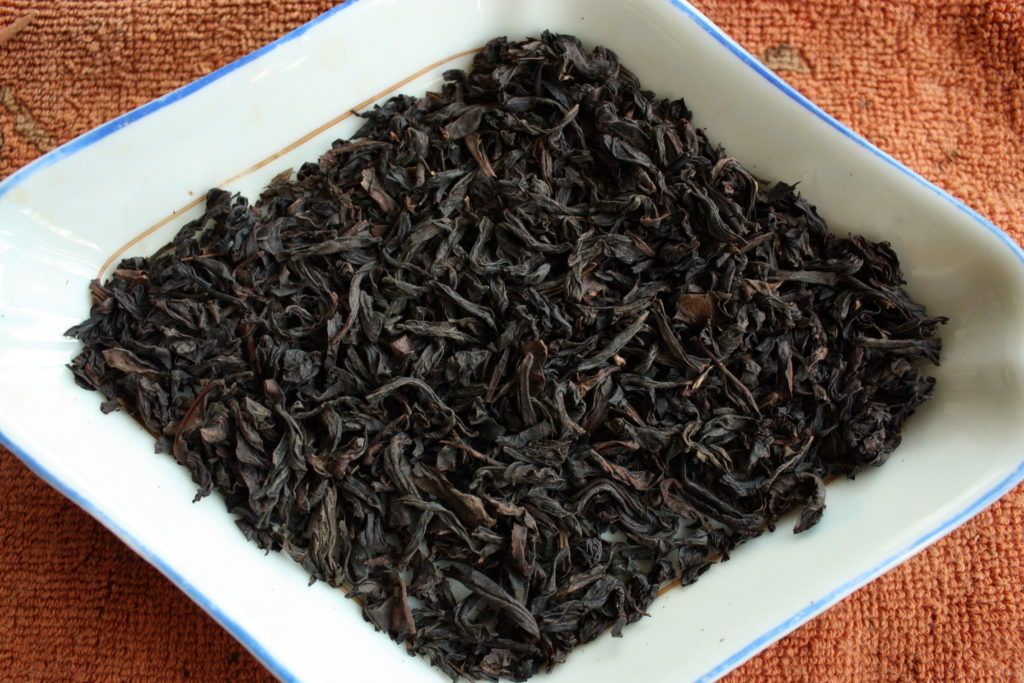 While I usually hesitate to judge teas by the way the leaves look, in this case, I have to say it’s pretty obvious something is not quite right with the foshou. Yes, this bag is 10g instead of 7 – one reason I dislike these pre-packaged bags of tea is that they limit you to whatever pre-set amount of tea is in the bags.
While I usually hesitate to judge teas by the way the leaves look, in this case, I have to say it’s pretty obvious something is not quite right with the foshou. Yes, this bag is 10g instead of 7 – one reason I dislike these pre-packaged bags of tea is that they limit you to whatever pre-set amount of tea is in the bags.
 RSS - Posts
RSS - Posts
I took you at your suggestion and have been reading some of your old post-Covid posts. I haven’t been to…